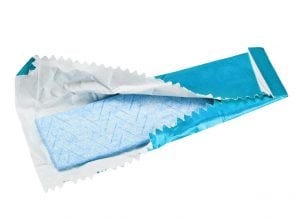How Diet Sweeteners Make You Fat
Just By The Taste, Smell, Sight And Thought Of Food
Are you hungry all the time? Science shows that the diet sweeteners increase hunger. Most people agree - you don’t feel satisfied after eating a sugar-free snack or meal. Many scientific studies show the physical reasons why you don’t feel full.
People write me all the time that:
I had a cup of sherbet at a friend’s house the other night, and I knew it was diet because it didn’t taste like real sherbet, but what made the biggest impression on me was after I finished eating it, I wasn’t satisfied. I felt as if I had not eaten a cupful of sherbet at all, and I could have had another one to feel satisfied. That’s the problem with these diet products - they don’t do anything for you - you want to eat more just to feel satisfied.
Just seeing a burger or a cold cola activates your brain - specifically your hypothalamus, which sends a signal through your nervous system to your digestive organs to prepare to digest incoming food. This signal primes your body to begin digestion and nutrient processing, ensuring your stomach and intestines are ready before any food arrives. Thinking about a juicy drive thru burger can make your mouth water and your stomach growl, even if you haven’t eaten yet.
Aspartame was shown in laboratory studies to change insulin levels because of the “cephalic phase insulin response.” A cephalic response is a digestive reaction triggered in your brain by the taste, smell, sight or thought of food. Your digestive system, from your mouth to your colon, can be affected by these responses. Changes in cephalic phase responses such as salivation, gastric acid production and liver metabolism, alter your normal appetite.
The cephalic phase response is your body’s initial physiological reaction to the sight, smell, taste, and even the thought of food, before it’s consumed. It’s the first stage of digestion, triggered by sensory stimuli, and prepares the digestive system for food intake.
This is important to understand because when you use the artificial sweeteners, this response is what keeps you hungry, and explains why you gain weight when you use fake sugars.
Your brain, via the vagus nerve, signals your digestive system to start working when you eat a fake sugar. This leads to:
Increased saliva production, which contains the digestive enzymes in your mouth;
The release of gastric acid and digestive enzymes in your stomach;
The secretion of insulin from your pancreas to prepare for nutrient absorption and sugar assimilation;
Stimulation of appetite and gut sensation.
This response accounts for about 20% - 30% of total gastric secretion during a meal, and it kicks off the broader digestive process. This trigger to begin digestion is heavily influenced by psychological factors like appetite and food appeal, but when you eat or drink a fake food that has no nutritional value, you will remain hungry because your body received no nutrients to process after this process was triggered. Your body is ready to digest nutrients, so it waits for you to provide it some. Hence, you remain hungry.
Michael G. Tordoff, Department of Neurobiology, Physiology and Behavior, University of California at Davis, published findings where aspartame in chewing gum increased hunger due to the oral stimulation of the added chemicals. His study also showed a gender-related sweetness response, which explains why certain people feel “ravenous” after consuming aspartame-containing products, while others do not.
The cephalic phase insulin response is when a sweet taste triggers your brain to expect calories and carbohydrates coming in, like incoming sugar. When you fake out your body with a fake sugar, and no nutrients are delivered, your body activates a “hunger response,” which creates a constant need for incoming food.
Besides affecting your insulin levels, serotonin, and your body’s hunger response, chemical sweeteners also increase cravings in yet another way by altering your blood sugar. This can be especially dangerous to people with diabetes or epilepsy, and can cause fluid retention, giving your body a puffy and bloated appearance, and it increases cellulite.
Another study by Tordoff and Friedman has shown that test animals have the urge to eat more food after ingesting artificial sweeteners, and their cravings can last up to 90 minutes. They documented when blood levels for insulin production are normal, the animals consumed more food than the ones who did not eat any artificial sweeteners. They also showed that high levels of insulin were shown to be the cause of hunger.
The result was fat rats.
Science also shows an increase in appetite stimulation, In human aspartame studies, scientists duplicated this urge to overeat. Blundel and Hill showed that “most artificial sweeteners enhance appetite and increase short-term food intake.” They reported: “After ingestion of aspartame, the volunteers were left with a residual hunger compared to what they reported after eating glucose (sugar). This lingering hunger leads to increased food consumption.”
The result: fat humans.
The research proves that your brain retains the urge to eat when your taste buds are stimulated. If stimulated without eating “real” nutrients, you stay stimulated waiting for food. Your body does not recognize the fake foods as food.
So, before you tear open that little colored packet of diet sweetener and stir it into your coffee, ask yourself this question:
Do diet sweeteners really help you lose weight, or do they keep you hungry so you eat more and gain weight in the long run?
This is an excerpt from my new book to be released in December 2025, The Sweetener Wars: The Battle for Diet Sweetener Profits
_______________
If you want to learn more about healthy living and disease prevention, contact me at janethull.com. Remember that you are never alone when you are looking for good health!
I look forward to supporting you on your journey to alternative health and wellness.
_____________
Disclaimer: This article is for informational purposes only, and is educational in nature. The FDA may not have evaluated some of the statements. This article is not intended to diagnose, treat, cure, or prevent any disease. Please discuss with your own, qualified health care provider before adding supplements or making any changes to your dietary program.
Before taking vitamins, consult your doctor; pre-existing medical conditions or medications you are taking can affect how your body responds to multivitamins.
You have our permission to reprint this article if you attribute us with a live back-link to this article and the youtube links.
http://www.janethull.com/




